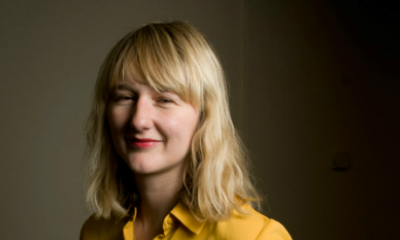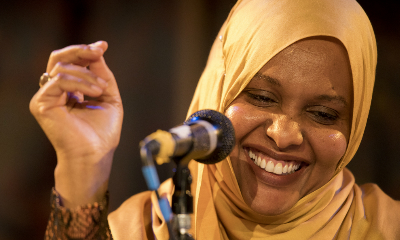
Clare Pollard is a poet translator, journalist, teacher and poet in her own right. Her first collection of poems The Heavy-Petting Zoo was published by Bloodaxe Books when she was still at secondary school. Since then she has gone on to win multiple awards and is highly regarded as a poet translator of Somali, Hungarian, Arabic, Latin, Polish, Czech and Slovakian poetry.
London Calling: What got you interested in translating poetry in the first place?
Clare Pollard: I was on a British Council tour doing readings with a group of young British poets. When we were in Hungary I was encouraged to translate the poet Anna Szabo. I had always thought that because I’m not a linguist I wouldn’t be allowed to translate, but Anna was pleased with the results and asked me to work on more poems. I enjoy trying to use aspects of the form, find the perfect words, solve problems. It’s a bit like doing a puzzle and is very satisfying when a translation works.
LC: What is the process you go through when translating a poem from its native language into English?
CP: I always have the original so I can see the form: the shape it makes on the page, whether there are rhymes and so on. It’s useful to hear the original read out loud to understand its music. It helps to be given some cultural context. I usually work from a literal (a very basic translation) and make it work as a poem in English. Ideally I can ask the poet themselves questions, although this only works if they are alive! I couldn’t ask Ovid what he meant for my translations of his Heroides.
LC: How difficult is it to stay true to the essence of the original poem while still retaining your writerly voice?
CP: I have no interest in retaining my own writerly voice when I’m translating. I have my own poems for that. The interest lies in getting into the nitty-gritty of another writer’s work and finding out what they are doing. I want to represent their vision the best I can and expand my sense of what is possible in English poetry.
LC: Every single word holds its own importance in poetry. How do you translate the meaning of an individual word if there isn’t a translatable word in English?
CP: Finding a solution is part of the fun. English is a very extensive, nuanced language, so there’s usually some way to do it if you think long enough.
LC: What challenges do you face when translating a poet who has a very different heritage and culture from your own?
CP: The fun is that the challenges are always different. Translating the Somali poet Caasha Lul Mohamad Yusuf brings technical challenges because her poetry is structured around alliteration. She often references the Quran so there are allusions I can miss that would be obvious to a Somali audience. You worry about misunderstanding, and that you might not be able to carry a poet’s particular formal skill or music into English.
LC: In Somalia, poetry is regarded as the highest art form. What themes do you find reoccurring in Somali poems, and why do you think this art form is so important to their culture?
CP: There’s lots of romance. Love, men and women, the romance of the land itself. The green after the rain; the honey. It can be very delicate and lyrical. There’s also politics. Lots of politics. There’s a real sense that poetry matters, that people are listening to what poets say. Somali culture was traditionally nomadic, so it’s no surprise poetry is important. Unlike other art forms, a poem is so light you can carry it in your head.
LC: What is your involvement with the Poetry Translation Centre?
CP: I’ve been translating Somali poems for them for five years now, and Somali week has become a very important date in my diary! I’ve particularly loved working with Caasha Lul Mohamad Yusuf, and am excited that the PTC are going to publish a major book of her work next year with Bloodaxe called The Sea- Migrations. She writes so powerfully about being a black Muslim woman and immigrant. Her poems feel very necessary right now. I’m also involved in the PTC’s translation workshops. Every week we look at a poem from a different language, hear about the context and culture from a literal translator and attempt a group translation. Last term was a crash course on everything from Chinese poetical ambiguities to Swahili syllabics. It’s amazing what good translations the collaborative process can create.
LC: For someone who has never read translated poetry before, where is a good place to start?
CP: The Poetry Translation Centre anthology My Voice is a wonderful way in. It has the originals facing the translations which is really important. The magazine Modern Poetry in Translation is also fantastic.
LC: What do you think the medium of poetry does that no other art form can do?
CP: I’m drawn to the intensity. In a novel it can take several hours of emotional investment to get to the place where you cry, a good poem can do it in thirty seconds.
You can book for our January-March 2017 Poetry Translation Workshop Series here.


